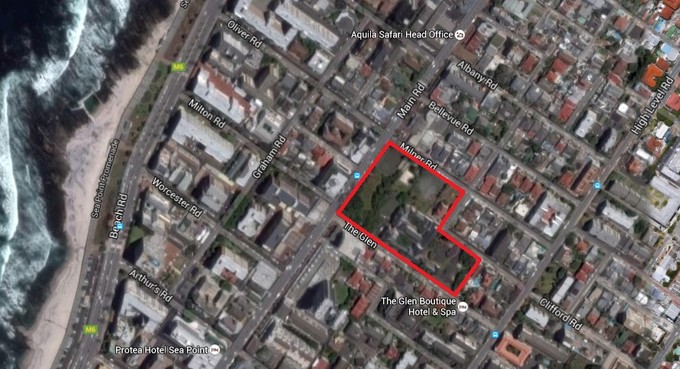Calls to halt sale of prime city land
Civil society organisations and Western Cape Province clash over four inner city properties
The Western Cape Provincial Government is set to sell or lease four prime Cape Town properties to private investors, despite repeated calls by various organisations including Ndifuna Ukwazi, the Social Justice Coalition and Equal Education, to halt the sales and consider the development of the sites for affordable housing.
The four properties are on prime land in the CBD or surrounding areas: the Alfred Street Complex in the city centre, the Helen Bowden Nurses’ Home in Green Point, Top Yard in Gardens, and the former Tafelberg Remedial High School in Sea Point, which has already been sold to the Phyllis Jowell Jewish Day School.
In Ndifuna Ukwazi’s (NU) correspondence to the province on 4 February this year, the organisation cautions the province against “any disposal and transfer that does not address the need for mixed-use and mixed-income housing”.
NU also asks why some or all of the sites have been declared as “surplus”, meaning that they no longer support the service delivery objectives of the Western Cape. The organisation calls for a feasibility assessment to show whether the province considered alternatives to private investment.
Correspondence between the province and NU, the Social Justice Coalition (SJC) and Equal Education (EE) began in April last year with a joint submission calling for the Western Cape government to halt the sale or lease. The organisations claim that “instead of promoting and encouraging the use of available land for the development of plans for mixed, affordable, and low-cost housing within Cape Town, the City and Province continue to entrench apartheid-era planning”, adding that this is “unlawful in terms of the Constitution”. They also highlight the shortage of available land in Cape Town.
The Province has yet to respond to NU’s latest letter, but in an earlier response to the SJC, the province admits that there is “a severe shortage of available land in the Metro” and agrees that “the legacies of apartheid-style type spatial planning need to be reversed”.
Where the Province’s approach differs from that of NU, SJC and EE is that the Province believes that in order to fund developments for the poor it is necessary to “extract maximum value from the more valuable inner city properties to create an income stream and a development fund from which projects for the poor can be cross-subsidised”.
“There is a vast difference between developing housing in the CBD and developing housing at the edges of the Metro. The financial modelling for affordable low cost and social housing is heavily dependent on aspects such as government subsidies, free land and ownership solutions. In the inner city, this modelling is simply impossible to apply and a very different approach, factoring in the high cost of land, the cost and complexity of building high-rise structures, issues of cross-subsidisation within mixed-use, mixed-tenure solutions and the management, maintenance and operations of such developments, is required,” wrote Donald Grant, the Western Cape MEC of transport and public works in a response.
The four sites were advertised at an investors’ conference in March last year where their desirable locations as well as their development and investment potential were highlighted. No mention was given to the possibility of making the sites into any form of social housing.
The controversy over whether the sites should be declared “surplus” stems from the Sea Point property being declared surplus.
According to the Government Immovable Asset Management Act (GIAMA), a “surplus” immovable asset is one that “no longer supports the service delivery objectives of the user [the Western Cape Province]”. NU says it does not know if all four properties have been declared “surplus”, but notes that the properties were all advertised in the same process.
The GIAMA also states that before an “immovable asset” is declared “surplus” it must be determined whether the site can be used “in relation to government’s socio-economic objectives, including land reform, black economic empowerment, alleviation of poverty, job creation and the redistribution of wealth”.
NU believes that the declaration of any or all of the four properties as surplus is “unreasonable” as Cape Town has a shortage of well-located and available land for objectives such as housing provision, land redistribution and service delivery.
Another document that NU believes supports its demand is the Western Cape Provincial Spatial Development Framework of 2014.This states that the province must “proactively plan, align and coordinate the strategic use and disposal of public land to ensure that opportunities for its use for public housing are not lost”.
Furthermore, the Housing Act 107 of 1997 stipulates that the province “give priority to the needs of the poor in respect of housing development”.
“What the Province should have done was frame the engagement around possibilities for affordable housing, including mixed income or social housing,” says Jared Rossouw, deputy director at NU.
On Saturday 13 February, NU will launch a campaign demanding that the four sites be retained by the Western Cape Provincial Government and developed for affordable housing. The launch will take place at 1pm at 40 Long Street, Cape Town.
Support independent journalism
Donate using Payfast

Don't miss out on the latest news
We respect your privacy, and promise we won't spam you.
© 2016 GroundUp. 
This article is licensed under a Creative Commons Attribution-NoDerivatives 4.0 International License.

